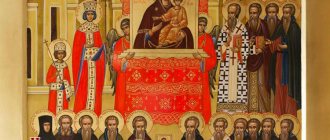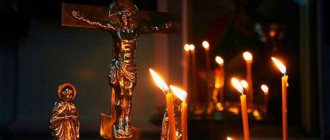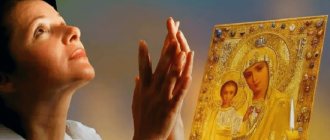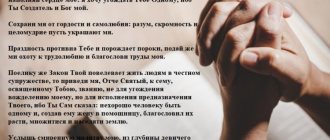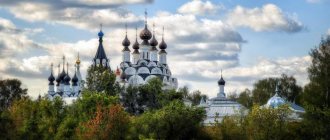History of the holiday and the rite of the Triumph of Orthodoxy
The Week of the Triumph of Orthodoxy is associated with the VII Ecumenical Council of 787, which finally established the veneration of icons in the Orthodox Church after a long period of iconoclasm. The holiday itself arose in 843 and was dedicated to the final victory over the heresy of iconoclasm. Thus, the period of development of Christological theology (Orthodox teaching about Christ) ended in the Church, and the icon here became the last visible evidence of the reality of the Incarnation. Since then, the Triumph of Orthodoxy began to be celebrated on the first Sunday of Great Lent, since its very first celebration in 843 fell on the first Sunday of Great Lent.
Triumph of Orthodoxy
(Celebrated on the first Sunday of Lent)
The establishment of the holiday is connected with the events of the Council of Constantinople in 843, convened by Empress Theodora to restore icon veneration in the Byzantine Empire.
After a church council that condemned the iconoclasts and restored icon veneration in the Empire, Empress Theodora organized a church celebration, which fell on the first Sunday of Lent, which was March 11 in 843 (according to other sources, February 19). One of the Byzantine chroniclers described this event this way:
“The Queen invited His Holiness Patriarch Methodius to notify and gather all Orthodox metropolitans, archbishops, abbots, clergy and laity to come to the Great Church of God with honorable crosses and holy icons on the first Sunday of Holy Lent.
And when countless people had gathered, Tsar Michael himself came with his holy and Orthodox mother Theodora and with the entire synclite... having united with the holy Patriarch, they moved together from the altar with the holy icons and the honorable cross and the holy gospel and went with the litia to the gates of the palace, the so-called Centaurids. And after a long prayer and a sorrowful, mournful and tender cry... they returned to the holy temple to celebrate the divine mysterious liturgy with great joy and triumph.
And thus the holy and honorable icons were restored for veneration and worship in the temple of God. The pious autocrats, together with the all-honorable and holy Patriarch Methodius and the metropolitans and venerable ascetics who were then with him, decreed: annually on the first Sunday of Holy Lent, solemnly celebrate in the Great Church of God this holy and honest holiday, which is celebrated to this day. The icons were simultaneously placed in all the churches of Constantinople.”
In memory of this event, significant for the Christian world, and in memory of Empress Theodora, every year on the first Sunday of Great Lent, the Orthodox Church solemnly celebrates the restoration of icon veneration, called the “Triumph of Orthodoxy.”
By the 12th century, a special rite of the Triumph of Orthodoxy had developed (Followment on the Sunday of Orthodoxy, otherwise Synodik), which by the 14th century was supplemented with texts containing Orthodox dogmas. The text of the service proclaims the triumph of the Church over all existing heresies, and affirms the decrees of the seven Ecumenical Councils. A special place in the service is occupied by the rite of anathematization of persons who have committed grave sins against the Orthodox Church.
In Russia, the rite of the Triumph of Orthodoxy was introduced in the 14th century, and the names of Russian heretics were added to it. In total, by the 18th century it contained 20 anathemas and up to 4,000 names of people declared heretics. In 1767, the rite of the Triumph of Orthodoxy was published, edited by Archbishop Gabriel (Kremenetsky) of St. Petersburg, who excluded from it many names of persons to whom “eternal memory” was proclaimed, as well as the names of many civil criminals and schism teachers to whom anathema was proclaimed. The rite was performed annually in cathedrals in the middle of the temple in front of the icons of Christ and the Virgin Mary. In 1801, the rank was noticeably shortened, it began to only list heresies, without mentioning the names of heretics, and only Grigory Otrepyev and Ivan Mazepa remained among the names of state criminals. In 1869, the names of state criminals were removed from the text of the rank. By 1917, the rite of the Triumph of Orthodoxy included twelve general anathematisms without indicating the names of specific individuals.
TROPARION
Troparion, tone 2
We worship Your most pure image, O Good One, asking for forgiveness of our sins, O Christ our God: by the will of Your flesh You deigned to ascend to the cross, so that You might deliver Him from the work of the enemy. Thus we cry out to You in gratitude: You have filled all with joy, our Savior, who came to save the world.
Kontakion, voice 2
Thy ineffable and Divine sight of man, the Indescribable Word of the Father, and the unwritten and God-written image is victorious leading to Thy false incarnation, we honor him with kisses.
CANON
(To the Triumph of Orthodoxy)
Troparion, tone 2
We worship Your most pure image, O Good One, asking for forgiveness of our sins, O Christ our God: by the will of Your flesh You have deigned to ascend to the Cross, so that You may deliver what You have created from the work of the enemy. Thus we cry out to You in gratitude: You have filled all with joy, our Savior, who came to save the world.
Canon, voice 4
Song 1
Irmos:
Seas of the Black Deep with damp feet, ancient Israel, walking on foot, with the cruciform hands of Moses, defeated the Amalek power in the desert.
Chorus:
Glory to Thee, our God glory to Thee.
Splashing with joy today let us cry out faithfully: how wonderful are Your works, Christ, and great is the power, our like-mindedness and agreement!
Glory to You, our God, glory to You.
Come let us celebrate a joyful day of wisdom, now heaven and earth are rejoicing, and the angels are in order, and the assembly of people is fairly celebrating.
Glory to You, our God, glory to You.
Having seen the great good deed, let us clasp our hands: the dispersed ouds of Christ are united in unity, and we praise God who gave peace.
Glory:
The Church has been given victory today, by God's move and advice, to Michael and Theodora, who piously upheld the faith of our Kings.
And now:
The weapons of the wicked have disappeared in the wake of heresies: for Thy temple, Most Pure and Pure, in images adorned with all-beautiful sight, now we rejoice in all-sacred ways.
Song 3
Irmos:
Your Church rejoices in You, Christ, calling: You are my strength, Lord, and refuge, and confirmation.
Glory to You, our God, glory to You.
No one will raise an eyebrow at the wicked heretics today: for it is the power of God that has kept Orthodoxy.
Glory to You, our God, glory to You.
Let the clouds of prophecy sprinkle life-giving dew from Heaven to us today for the rise of faith.
Glory to You, our God, glory to You.
With the blessing of the secret apostles of Christ, let the trumpets cry out louder than nature for the correction of honest images.
Glory:
Let us sing to Christ, who showed us a pious, Christ-loving queen with a divinely crowned branch.
And now:
Thy sacred village has reached the faithful, Most Pure One, now illuminated with light-like grace, we pray.
Lord have mercy.
(
Three times
)
Sedalen, voice 1st
Your divine image, in the image of Christ, clearly cries out the Nativity, unspeakable miracles, the free crucifixion. The demons will be driven away with fear, and they will weep in slander, as if they were partakers of these.
Glory:
It sacredly flaunts the images of prophets, apostles, holy martyrs, and all saints with icons and images; The mental groom and the Bride are adorned with clever beauty, Mother of the Highest Zion.
And now:
To Love, O Pure One, those who venerate Thy holy icon, and the true Mother of God, according to those who proclaim and faithfully worship Thee, Thou art the guardian, and sovereign intercession, turning away every cruel thing from these far away, as though all things are mighty.
Song 4
Irmos:
You are exalted, having seen the Church on the Cross, the righteous Sun, standing in its rank, worthy of crying out: glory to your power, Lord.
Glory to You, our God, glory to You.
By the influx of the Divine Comforter, sanctify Your temple, and by His coming, cast away the heretical charm of the Most Merciful Word of God.
Glory to You, our God, glory to You.
Having delivered Thy most needy people of wickedness, show piety kindled by zeal, and by faith they cry: glory to Thy power, O Lord.
Glory to You, our God, glory to You.
We rejoice in sacred images, images of Christ and the Mother of God, the radiant Divine village.
Glory:
The queen is adorned in both ways, desiring the true Kingdom of Christ, painting a most pure image and images of saints.
And now:
Having incarnately given birth to the Divine Word, You have shown the divine sanctification of this: in the same way, we renew Your light-like temple.
Song 5
Irmos:
You, Lord, my Light, you came into the world, Holy Light, turn those who sing Your praises from the darkness of ignorance to faith.
Glory to You, our God, glory to You.
Lord grant Thy Church the affirmation to remain unyielding in the age of ages from the turmoil of heresies.
Glory to You, our God, glory to You.
The lordship arose from above throughout the whole earth, given to the faithful joy and Divine intercession.
Glory to You, our God, glory to You.
O One Good One, and Source of goodness, You raise the horn of our blessed Emperor, who honors Your image.
Glory:
The light that is not lost on us has risen from piety, by the divinely inspired commands of faithful shepherds and by the divinely wise mania.
And now:
Renew for us the ancient splendor, Most Pure Mother of God, and sanctify this Thy house with Thy grace.
Song 6
Irmos:
I will devour Thee with a voice of praise, Lord, the Church cries out to Thee, having been cleansed of demonic blood, for the sake of mercy the Blood flowed from Thy side.
Glory to You, our God, glory to You.
The faithfully worshiped image of the Lord is painted and venerated, and the Church again receives boldness, piously glorifying the Savior.
Glory to You, our God, glory to You.
The Church of Christ is exposed to the lamentations and darkness of heresies, and wears the robe of joy, and is covered with divine and luminous grace.
Glory:
The Orthodox cathedral received the blessings of the ancient illumination, Theodora with the wave of the queen, and her son, the pious Michael the autocrat.
And now:
From ancient times you commanded that the tabernacle should be, as in the tabernacle of words, the One most glorified lives in You, glorifying Your temple, the Virgin of miracles.
Lord have mercy.
(
Thrice
)
Glory, And now:
Kontakion, tone 2
The indescribable Word of the Father, from Thee the Mother of God we describe ourselves incarnate: and imagining the defiled image into the ancient, with the Divine goodness of the mixture; but confessing salvation, in deed and word, we imagine this.
Ikos
This is a sacrament of vision, the ancient prophets of God-like inspiration were, for our sake at the end of the ages they reached the foreshadowing, having received this radiance, we received the Divine mind from it, we know the One Lord God, worshiped in three Hypostases; and having served the One, having one faith, and having one baptism, we have put on Christ; but confessing salvation, in deed and word, we imagine this.
Song 7
Irmos:
In the cave of Abraham, the Persian youths, scorched by the love of piety rather than by flame, cried out: Blessed art thou in the temple of Thy glory, O Lord.
Glory to You, our God, glory to You.
May the Church's lordship rejoice in the Divine love of the Angelic army, chanting with wisdom: Blessed art thou in the temple of Thy glory, O Lord.
Glory to You, our God, glory to You.
The Church of the firstborn, and the triumph rejoices, seeing now the Divine people, singing with one wisdom: Blessed art thou in the temple of Thy glory, Lord.
Glory:
Having delivered the previously dark heresies through the mania of Theodora, the venerable queen, we sing: blessed art thou in the temple of Thy glory, O Lord.
And now:
Thou art exalted above the highest celestial states, the All-Pure One, who was once the Mother of the All-Giver; Rejoicingly we cry: blessed art Thou among women, O All-Immaculate Lady.
Song 8
Irmos:
Daniel stretched out his hands, the gaping lions in the den; Having quenched the fiery power with virtue, girded with virtue, the zealous youths cried out: bless all the works of the Lord the Lord.
Glory to You, our God, glory to You.
We preserve the laws of the Church of the Fathers, we write images and kiss the lips, and the heart, and the will of Christ, and His saints, calling: bless all the works of the Lord the Lord.
Glory to You, our God, glory to You.
To the original manifestation of the image, we exalt honor and worship, we honor those who speak God with the teaching that follows, and we call to Christ by faith: bless all the works of the Lord the Lord.
Glory:
Having illuminated your mind with the enlightenment of the Divine Spirit, honorable queen, possessing the fruits of God-wise wisdom, love the splendor of the Church of Christ, and the beauty, blessing together with the faithful Jesus the God-man.
And now:
With the rays of light, the sanctified Thy Divine House now overshadows everyone with a cloud of the Spirit, and sanctifies the faithful who sing: bless all the works of the Lord.
Song 9
Irmos:
The uncut stone from the uncut mountain is for You, the Virgin, the cornerstone cut off, Christ the aggregator of the dispersed nature. Thus, having fun, we magnify You, Mother of God.
Glory to You, our God, glory to You.
Decorated with sacred images, the ever-honorable Church, with reverence, let us all cry out to the parishioners and God: We magnify the Trisagion to You.
Glory to You, our God, glory to You.
Having acquired honor and glory, the Church, Your Cross and honorable icons, and images of saints, with joy, O Lord, magnify You with joy.
Glory:
Illuminate our kings with Your Divine glory, O Generous One, and with the hosts of Angels, and protect all these weapons, rebuking them with the ferocity of tongues, O Lord.
And now:
The foremother of Eve will condemn the Mother of God, for You, the Master of all, indescribably, the Pure One, gave birth to Him, and now we kiss His likeness on the icons.
Personal Celebration
If we talk about the spiritual meaning of the holiday for us, ordinary believers, for our spiritual life, then, of course, the Triumph of Orthodoxy can be understood somewhat more broadly, not only in the dogmatic-theological sense. When a person embarks on the path of fasting, trying to pray more and ascetically limit himself in some way, then this is where the triumph of faith begins.
Of course, we can simply declare our Orthodox faith in words, but constant life in Christ, the zeal with which many begin Lent (and which, unfortunately, not everyone has enough for the entire Lent) - this can be considered our kind, a personal Triumph of Orthodoxy.
This is already a certain experience of a person, and not just a memory of events and dogmatic disputes in the Church almost a thousand years ago.
In modern realities, the Triumph of Orthodoxy must also be understood as a kind of personal conclusion of the beginning of Lent, when a believer really tries to live as a Christian should live, to the maximum extent possible for himself. First of all, a person prays more, goes to services, to the penitential canon of St. Andrew of Crete... And all these efforts ultimately lead to the triumph of personal life in Christ. It is on this, it seems to me, that it is worth emphasizing today, and not on dogmatic definitions, which undoubtedly affirm this holiday.
Prayer singing on the Sunday of Orthodoxy
After the reading of the hours or after the liturgy, all the clergy leave the altar. The icons of the Savior and the Mother of God are brought out and placed on a lectern in the middle of the temple.
Deacon: Bless, Master.
Priest: Blessed be our God always:
Chorus: Amen. Heavenly King:
Reader: Trisagion. According to Our Father: Lord, have mercy (12). Come, let us worship: Psalm 74: We confess to You, O God: Glory to this day: Alleluia (three times).
The deacon pronounces the great litany and, following the petition for those floating, encloses petitions:
Let us pray to the Lord that we may look upon our Holy Church with a merciful eye and keep it unharmed and invincible from heresies and superstitions and protect it with our peace.
Oh, to calm down the tearing of it and, by the power of the Holy Spirit, to convert all those who have retreated to the knowledge of the truth and belonging to His chosen flock. Let's pray to the Lord.
Let us pray to the Lord to enlighten everything with the light of His God-mind, and to strengthen His faithful and maintain those who are unshakable in their orthodoxy.
O let us be delivered: and so on
At the cry of the singers, in voice 4:
God is the Lord, and appear to us:
And abiye troparion:
Give thanks to Your unworthy servants, Lord, / for Your great blessings upon us, / we glorify You, we bless, we thank You, we sing and magnify Your compassion, / and slavishly we cry out to You in love: // Bla Godetel, our Savior, glory to You.
Glory, voice 3:
Thy blessings and gifts to the tuna, / as a slave of indecency, having been favored, O Master, / who diligently flow to You, we offer thanksgiving according to our strength, / and to You, as the Benefactor and Creator, we glorify, we cry: // glory to You, God aka Most Generous.
And now, voice 4:
As the firmament above showed the beauty, / and you showed below the beauty of the holy city of Your glory, O Lord, / establish this forever and ever, / and accept in it our unceasing prayers offered to You by the Mother of God, // Life and Resurrection of all knowledge.
Deacon: Come on.
Priest: Peace to all.
Reader: And to your spirit.
Deacon: Wisdom, let us hear.
Reader: Prokeimenon, tone 4: Plantings in the house of the Lord, in the courts of our God, will flourish.
(Verse:) The righteous will rejoice in the Lord and trust in Him.
Deacon: Wisdom!
Reader: Reading the Epistles of the Holy Apostle Paul to the Romans.
Deacon: Come on.
Apostle, concept 121:
Brothers, I pray you, beware of those who create strife and strife, except for the teaching that you have learned, and turn away from them. Such are the Lords who do not work for our Jesus Christ, but for their own belly: who with good words and blessings deceive the hearts of the gentle. Your obedience has reached everyone: I rejoice in you. I want you, the wise, to do good, and the simple to do evil. May the God of peace quickly crush Satan under your feet. The grace of our Lord Jesus Christ is with you, amen.
Gospel of Matthew, conceived 75.
At the special litany, according to: We also pray for the Great Lord: petitions are added:
Do not want the death of sinners, but expect conversion and repentance, unite everyone in Your Holy Church, so that through true faith and piety You, our God, will be glorified, we pray to You. Omnipotent Creator, hear and have mercy.
Having given us Your commandment, to love You, our God, and our neighbor, so that hatred, enmity, resentment, and other lawlessness will cease, and let true love reign in the hearts ours, we pray to You, our Savior, hear and have mercy on us .
The priest says the exclamation: Hear us, O God: Choir: Amen.
Deacon: Let us pray to the Lord. Chorus: Lord, have mercy.
The priest reads a prayer:
Almighty God, Master and Creator of all creation, fill everything with Your majesty and support with Your power! To You, our All-Giftful Lord, we, who are unworthy, offer thanksgiving, for You do not turn away from our iniquities for our own sake, but rather precede us with Your bounties. You sent Your only begotten Son for our deliverance and proclaimed Your immeasurable condescension to the human race, as You desired and expected, even if we turned to You and saved to be one. You, condescending to the weakness of our nature, strengthen us with the omnipotent grace of Your Holy Spirit, comfort us with saving faith and perfect hope of eternal blessings and, guiding Your chosen ones to the Mountains of Heaven he observes like the apple of his eye. We confess, Lord, Your great and unconditional love for mankind and mercy. But, seeing many attempts, we diligently pray to Thee, All-merciful Lord: look upon Thy Church and see that Thy saving gospel is even joyfully received, but thorny vanities And it creates passions in some with little fruit, in some with little fruit, and in some the increase of iniquities, heresies, and schisms that oppose Your gospel truth, retreat from Your inheritance, deny Your grace and subject themselves to the judgment of Your Most Holy Lay ́va. Most merciful and All-Powerful, do not be completely angry with the Lord! Be merciful, Your Church prays to You, presenting to You the Author and Finisher of our salvation - Jesus Christ, be merciful to us, strengthen us in orthodoxy by Your power, and enlighten those who err. Let prudent eyes, by Your Divine light, understand Your truth, soften their bitterness and open their ears may they know Your voice and turn to You, our Savior. Correct, Lord, create some corruption and a life that is not in accordance with Christian piety, so that we may all live holy and blameless, and thus saving faith will take root and be fruitful in our hearts. Do not turn Your face away from us, Lord, reward us with the joy of Your salvation. Grant, Lord, to the shepherds of Your Church their holy zeal, and dissolve their concern for the salvation and conversion of those who are led astray by the spirit of the Gospel. May we, with You guiding us all, achieve the perfection of faith, the fulfillment of hope and true love, and so forth
Let us glorify the purest heavenly Powers to You, our Lord, Father and Son and Holy Spirit, forever and ever.
Chorus: Amen.
[The deacon exclaims3: Who is the great God as our God? You are God, you alone work miracles.
Then in the highest voice: Who is the great God, even as we are our God:
And again in the highest voice: Who is the great God:
And the deacon continues: Celebrating the day of Orthodoxy, Orthodox people, let us especially glorify the Author of all good things, God, Who is blessed forever. This our God, providing for and establishing His beloved property - the Holy Church, the forefathers who fell away through the crime, comforting with His unfaithful word, laid the foundation for it in paradise. This our God, guiding us towards this saving promise, did not leave Himself unwitnessed, but proclaimed the salvation that wanted to be first through the forefathers and prophets, and depicted it in various images. This God is ours, the many-parted and diversified father of old who spoke as a prophet, in these last days he spoke to us in the Son, in whom also he created the eyelids, who proclaimed the Father’s good will toward us, revealed the heavenly mysteries, assure us by the power of the Holy Spirit. Ha about the truth of the gospel, the apostles sent to all preach the Gospel of the Kingdom to the world, confirmed by various powers and miracles. Following this saving revelation, holding fast to this gospel,
We believe in One God, the Father, Almighty, Creator of heaven and earth, visible to all and invisible. And in one Lord Jesus Christ, the Son of God, the only begotten, who was born of the Father before all ages: Light from Light, true God from true God, begotten, uncreated. Consubstantial with the Father, to Whom all things were. For our sake, man, and for our salvation, who came down from heaven and became incarnate from the Holy Spirit and the Virgin Mary, and became human. Crucified for us under Pontius Pilate, and suffered and was buried. And he rose again on the third day according to the Scriptures. And ascended into heaven, and sits at the right hand of the Father. And again He will come with glory, to judge the living and the dead, His Kingdom will have no end. And in the Holy Spirit, the Life-Giving Lord, who proceeds from the Father, who is with the Father and the Son, we are worshiped and glorified, who spoke the prophets. Into one Holy Catholic and Apostolic Church. We confess one baptism for the remission of sins. Tea of the resurrection of the dead and the life of the next century. Amen.
This is the apostolic faith, this is the fatherly faith, this is the Orthodox faith, this is the faith that established the universe.
Also, the Councils of the Holy Fathers and their traditions and writings, in agreement with Divine Revelation, are acceptable and affirmed.
To all who have striven for Orthodoxy, words, writings, teachings, sufferings
and with a life pleasing to God, as the defenders and helpers of this, the Church of Christ, creating the present remembrance, exclaims:
to the holy, blessed and equal-to-the-apostles Tsar Constantine and his mother Helen,
to the saints, noble and equal to the apostles, Grand Duke Vladimir and Princess Olza, to the holy noble prince Alexander Nevsky and Daniil of Moscow and other faithful Russians: eternal memory.
The choir here and further sings: Eternal memory. (Thrice.)
His Holiness the Orthodox Patriarch of Constantinople, Alexandria, Antioch, Jerusalem and All-Russia and His Eminence the Metropolitan, Archbishop and Orthodox Bishop: eternal memory.
To those who suffered and were killed in various campaigns for the Orthodox faith and fatherland by the leader and warrior and all Orthodox Christians, in true faith and piety and in the hope of resurrection to those who died: eternal memory.
The Orthodox Church of Christ, solemnly remembering those who labored in piety and representing this to all her Christ-named children in imitation, also has the duty to praise the exploits of these, like those of today. It is not through saving faith and virtue that those who prepare themselves for eternal bliss establish Orthodoxy.
(Here, at the discretion of the rector, the charter stipulates that the rite of anathematization be proclaimed. For the deacon’s exclamations and responses of the choir, see the supplement, p. 174)
Then the deacon exclaims:
Many years to our Great Lord and Father Alexy, His Holiness Patriarch of Moscow and All Russia.
The choir here and further sings: Many years. (Thrice.)
To the Most Holy Orthodox Patriarch of Constantinople, Alexandria, Antioch, Jerusalem and other Most Holy Orthodox Primates, many years to come.
Many years to our Lord, the Most Reverend (the name of the rivers, and his diocesan title).
To the Most Reverend Orthodox Metropolitan, Archbishop and Bishop and to all the sanctified clergy, many years to come.
May God protect our country, its authorities and its army, many years to come.
To all Orthodox Christians who rightly maintain the saving faith and obey the Church of Christ, grant, Lord, peace, prosperity, an abundance of earthly fruits and many years of life.
The priest reads a prayer:
Holy Trinity, glorify these and establish them even to the end in orthodoxy and create, so that everyone will come to the knowledge of Thy eternal truth, through the prayers of the Most Holy Lady Ourotokos and Ever-Virgin Mary and all saints oh. Amen.]
Glory to You, God, our Benefactor, forever and ever.
Singers: Amen.
And they sing the stichera of St. Ambrose of Milan, voice 3:
We praise you to God:
During the singing, the priest and the entire sacred assembly kiss the holy icons on the lecterns.
The prayer service for the Triumph of Orthodoxy is supposed to be performed before the liturgy. If the abbot deigns, a prayer service is served according to the prayer behind the pulpit, or after the dismissal of the liturgy.
Relationship leading to Christ
We remember that the feast of the Triumph of Orthodoxy ends the first and one of the strictest weeks of Great Lent. This is not accidental, since in general the Christian life leads a person to joy.
The only and main result not only of the first days of Lent, but also of the entire life of a Christian is joy and peace in the Holy Spirit. If we went through this stage well, prayed more and sinned less, tried to refrain from friction with our neighbors and, on the contrary, showed our good qualities towards them, then the result of all this will be true joy. Then the holiday itself, in a certain sense, we can call the personal Triumph of Orthodoxy.
And, of course, it is worth remembering that all the weeks and weeks of Lent have a certain relationship with each other. The entire post is built dramatically in a certain way. It has its own plot, which is constantly evolving. Each preacher can reveal the logic of Lent in his own way, but it is clear that it exists. This logic lies in the spiritual ascent of a person towards Bright Easter, towards the Risen Christ Himself.
[*] Serious sins of a person before the Church - heresy, apostasy, blasphemy against God, desecration and mockery of holy things, etc.
Triumph of Orthodoxy
In the Name of the Father and the Son and the Holy Spirit!
Truly, truly, I say to you, from now on you will see heaven open and the angels of God ascending and descending on the Son of Man (John 1:51).
In Sunday's Gospel reading we heard the words of the Lord Jesus Christ about the open heaven. Who among us would not want to enter it! For this purpose we were created, to inherit the Kingdom of Heaven; This is what we are called to do, to fill those empty places from which the evil angels have fallen; For this reason the heaven is open, so that you can enter into it.
But how can we enter the sky that is open to us, not having wings to fly into the heights of heaven? We are not Angels, but people burdened with the weight of our bodies. Yes, and Angels, although they have wings, but, according to the current reading from the Holy Gospel, do not fly into heaven, but ascend: you will see the Angels of God ascending..., and not flying.
This Gospel image points Christians to two conditions for a righteous life - contemplation as thought of God and activity as hard work. Thought of God is the wings of an angel, hard work is the path of ascension. It is not enough for us to fly high on the wings of God-thinking; it is appropriate to ascend with the feet of hard work. After all, the Angels also ascended, so that anyone who wanted could ascend from the earth into the open heaven. Thank God that heaven is open to us, but let us not be lazy about entering it ourselves.
From now on, it is said, you will see the sky open. What does it mean from now on? This means from this Holy Pentecost as a time of special abstinence and prayer. Temperance is called the foundation of all virtues. Let abstinence in food be one foundation of the spiritual ladder, and let repentance be the other foundation of this ladder - like fasting from evil deeds. These are two beams between which the steps of virtues are attached.
Why should you abstain from food? It is known that fasting dries out our body, weakens our carnal lusts and sinful passions, thereby taming all the enemy power that fights against us. It is necessary to fast in food precisely in order to, having dried up the swamp of carnal lusts within ourselves, to overcome and defeat the power and strength of the devil, who fights with us primarily through our own body.
Why should we abstain from evil deeds? It is appropriate to know that there are two types of evil deeds: some are committed from weakness, for example, from carnal voluptuousness. Other evil deeds are committed out of some special malice, such as: the sin of envy, murder, the sin of robbery and extortion, the sin of eating and destroying one’s neighbor; and these are the worst sins, the gravest of the first. For the sins of carnal sensuality are the sins of human weakness, which are tamed by abstinence in food; sins committed out of malice are sins of satanic enmity.
True fasting is alienation from evils, abstinence of the tongue, putting aside rage, lies and perjury. Without this spiritual fast, the first fast will not bring any benefit. Prayer, almsgiving, mercy, friendliness, love of God, humility, purity, chastity and other similar good qualities and deeds, as well as careful observance of all the commandments of God - all these are the essence of the steps of the ladder leading to heaven.
The great preacher of repentance, John the Baptist, cried out in the Judean desert, addressing the coming people: Repent... produce fruit worthy of repentance (Matthew 3:2, 8). What does fruit worthy of repentance mean?
As interpreters explain, the work of repentance is only satisfactory when it is equal in severity to some great sin committed; and how much a person has worked for sin before, the same amount he must work for God. According to the apostle: Just as you presented your members as slaves to uncleanness and to lawlessness for wicked works, so now present your members as slaves to righteousness for holy works (Rom. 6:19). And Saint Gregory calls a person a tree, known from the fruit, saying that repentance is known by the fruits, and not by the leaves or roots. After all, the Lord also cursed a tree that has leaves but is barren. A person, lamenting the sins he has committed, acquires the root of repentance - the thought and intention to confess sins; leaves are the implementation of a confession of sins to God before the spiritual father and a promise to correct oneself; the fruits are the fulfillment of the promised labors. The worthy fruits of repentance are those that are compared by one’s labors with the quality and quantity of sins committed before. The repentance of that Christian who, by some brief and easy limitation of the needs of his body, wants to be cleansed from long and severe mortal sins is unrighteous.
Oh, sinful man, living without repentance for his sins, as if wallowing in the mud of a swamp, but putting off his repentance for the future, putting off his repentance for old age! If you do not repent soon, believe the Angel of God, who swore that there will be no more time (Rev. 10:6). Suddenly a fatal illness will attack you: you want to repent, but there will be no time. Suddenly the execution of God will attack: you want to correct yourself, but there will be no time. You will fall into the hands of enemies, visible and invisible: you will want to cry about your sins, but there will be no time. Suddenly the last hour of your life will come, your sins will appear before your face: then you will want to accept the most difficult thing of repentance, but there will be no time. Now, now, without delay, while you have time for repentance, think about your sins, truly repent, and then there will be no more time. Amen.
St. Dimitry Rostovsky. Essays. M., 1786., part 1, l. 25 rev. – 33 rev.
